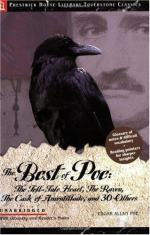|
This section contains 2,131 words (approx. 8 pages at 300 words per page) |

|
SOURCE: "The Accomplice in 'The Tell-Tale Heart,'" Studies in Short Fiction, Vol. 22, No. 4, Fall, 1985, pp. 471-75.
In the essay that follows, Witherington contests the apparently self-evident diagnosis of madness often applied to the narrator of the short story by taking into account Poe's more subtle engagement of the reader's assumptions and expectations.
"Poe's narrator tells a plain and simple story, which leaves no doubt that he is mad," T. O. Mabbott says in his preface to "The Tell-Tale Heart."1 Most readers would agree, not only because the murder of an old man seems motiveless, but also because the narrator's confession comes across as calculated and heartless. Whereas "The Cask of Amontillado" offers witty dialogue and a romantic setting, inviting us into the story and thus eliciting our sympathy for the narrator in spite of our antipathy to the murder, "The Tell-Tale Heart" entombs us with the narrator's...
|
This section contains 2,131 words (approx. 8 pages at 300 words per page) |

|


